A discussion with seven protesters who have faced down Trump and arenas full of supporters not having it
By Ryan Pitkin @pitkin_ryan
March 16, 2016
Over the last few months, Donald Trump rallies have become disturbing displays of Americana. Internet comment boards come to life. Bastions of bigotry.
Emerging from these WWE-like events is a small but rapidly growing group of people who stand against the fascistic rhetoric of Trump to show those watching from afar that he does not represent American ideals.
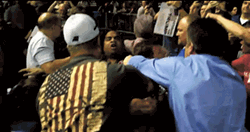
Video of a Trump rally in Fayetteville on March 9 shows men violently reacting to Tony Ndege’s peaceful protest. Another man, 26-year-old Rakeem Jones, was assaulted at the same rally. (Screenshot of video filmed by Patrick O’Boyle.)
At a December rally in Raleigh, 10 protesters took a stand to confront Trump’s hate speech. Three months later, at least 16 were escorted out of a Fayetteville rally, including a young black man attacked on camera by an older man egged on by Trump’s past incitements, including promises to pay the legal bills of anyone who assaulted a protester.
From that moment, the movement grew exponentially. Two days later in St. Louis, more than 30 protesters caused significant disruption at a Trump rally. Later that night, thousands of protesters showed up to a Chicago rally that the candidate ultimately canceled.
“As humans, we should find it to be a moral responsibility to stand up to hatred and bigotry, to stare it in the eyes and to disempower it. Furthermore, we must fundamentally reject even the suggestion of fascism, false prophets and demagoguery,” said James Tyson, a Charlotte activist who helped organize a protest at the Fayetteville rally in which he and three other white protesters formed a wall around a young black man named Tony Ndege as he held up a sign. “[Trump protests] must be done non-violently, and with deep love and respect for each other’s humanity. That’s my challenge to each and every one of you,” Tyson said.
To gain insight into what the experience is like for protesters inside a Trump rally and why it’s important to confront Trump and his supporters in these public spaces, Creative Loafing spoke with Ndege and six other protesters who have disrupted rallies throughout the Carolinas in 2016.
The following is an oral history of a time that is now and an issue that has yet to play out. Most conversations took place after the Fayetteville rally, before the Chicago rally was shut down.
Lowell Fleming is a 23-year-old from Charlotte. At the time we spoke, he had disrupted five rallies across the Carolinas. He and a group of others have become known as the AntiHateEight. The group, led by Marty Rosenbluth, usually stands silently in protest while Trump talks, each of them wearing yellow stars with the word Muslim or other messages written on them, recalling those worn by Jews in Nazi Germany.
Fleming: I saw the rise of Donald Trump as something where, if given the chance, I wouldn’t be able to live with myself if I didn’t protest him because I really just find the man awful. Friends of friends were going to Raleigh and I saw it as a chance to show conviction. After interrupting the first time in Raleigh, it ended an hour early. It was really cool to be a part of that, seeing [protestors] who were crying they were so scared, but then still seeing them do it, that was really cool.
In January, Fleming attended a rally with Rose Hamid, a Muslim flight attendant from Charlotte. Hamid gained national media attention during that rally when, while wearing hijab and a yellow star, she stood alongside Rosenbluth silently while Trump spoke.
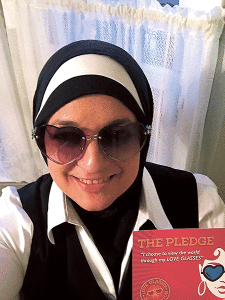
Rose Hamid
Hamid: The majority of people [who live overseas], and my husband works in the travel industry, so he meets a lot of tourists also, everyone from Middle Easterners to the Dutch, they have this misbelief that all Americans hate Muslims. I’m really concerned about that as an American — as an American and a Muslim — because it feeds that pipeline where groups like ISIS and others are trying to recruit folks and saying, ‘Look how Americans hate Muslims.’ That whole concept is dangerous for Americans. It concerns me that this image is being portrayed around the world and that’s what people are seeing; that Americans are so bigoted, and not just against Muslims.
Edie Garwood of Charlotte is a country specialist with Amnesty International focusing on Palestine, Israel and the Occupied Territories. She attended her first Trump rally with Rosenbluth in Aiken, South Carolina.
Garwood: I found Trump so offensive and scary that I felt like I needed to speak out against him. Last summer, I was calming down some European friends I know saying he only represents the fringe, that this is a passing thing. By October, I realized how really serious it was. He had a rally in Raleigh where they protested and I thought, ‘OK, if he ever comes within the sphere of where I live I will go protest.’
You watch movies about the Holocaust or other injustices that have happened in history and think, I wish I was there to do something. That was then, this is now. So, you can’t allow this kind of growth. I saw his rhetoric and the way he was able to play people, it’s very dangerous.
Michael Morton, the 63-year-old retired father of an Air Force captain, showed up at a rally in Concord with a message. He hadn’t protested anything in 45 years and didn’t know any other protesters, so he looked for the media pit and revealed his custom-made shirt reading Liar Trump on the front and Fascist Trump on the back.
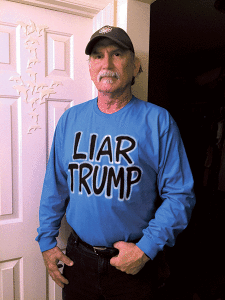
Michael Morton
Morton: I’m certainly frightened by the prospect of him being president, but I came out because I’m ashamed of what we’ve allowed him to do already. I think he’s rolled back relations between people for years that we should have started healing yesterday. It’s unbelievable. The bigotry and intolerance is just not something I can sit by and watch.
Being newly retired, these were supposed to be the golden years but I think they’re more the ‘No Excuse’ years. I get up every morning like I could do it or I could not, but I don’t have any excuse not to.
Jibril Hough, a Muslim living in Charlotte, has attended rallies in Aiken and Rock Hill with the AntiHateEight, yet he sat and protested alone, yelling at the stage until he was taken out of the venue rather than standing silently in protest.
Hough: They were curious about me throughout the day because I didn’t go into [the Aiken rally] undercover. I was wearing a kufi and I had a Public Enemy shirt on. I was sitting there calm and I wasn’t trying to engage anyone but people were curious about me.
I stood up and yelled, ‘Islam is not the enemy or the problem.’ Then I followed up by saying, ‘Close Gitmo’ because the question of Guantanamo Bay was on the table. When I stood up, I honestly felt like a black man at a Klan rally. There was a big 300-pound guy to my right who tried to put me in a headlock. The guy to my left jumped in. They were both pulling at me and everybody else was pointing and shouting. It was just so loud. My adrenaline started to flow and I didn’t feel a thing for a while until the next day. I was just in the moment. I’ve been a protester for a long time, but that was the first time it’s really been like that; being really surrounded.
Tony Ndege said his group’s protest in Fayetteville was foiled by plainclothes officers in the crowd.
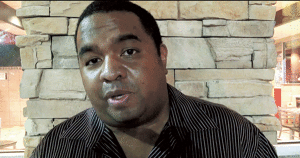
Tony Ndege
Ndege: We basically got up and four guys locked arms around me. We had a sign that said ‘All In Against Trump. All In Against Hate.’ The goal was to hold up the sign as long as possible before someone took it down. There’s a pretty significant security presence because we were fairly close to Trump. A plainclothes or security guard or something eventually got up on me. We were locked down and they kept pushing us and it grew in numbers. What finally got us, several people really violently used pain compliance holds on a couple guys around me and then they shoved us down.
[From the crowd] there was everything from cursing to — fortunately, I did not hear many racist epithets, I heard from a lot of folks in Raleigh that heard a lot of those — I did hear people screaming, calling me communist, basically just cursing at me, ‘Get a fucking job.’ By the time I was going through the walk of shame, they had knocked my shoes off. I probably should’ve had boots on or something. My knee had gotten twisted up a bit. I was still chanting as well. That was a way of not engaging. I was still chanting things like ‘Black Lives Matter’ or ‘All In Against Hate.’ It was a pretty overwhelming number of people screaming at me.
After getting the attention of media in Concord, Morton was quietly walked out. His treatment differed greatly from that of younger protesters throughout the nation, especially people of color.
Morton: One of the worst things is that I know that I was treated differently than those other people were going to be treated that day. There’s no doubt in my mind. They stayed within three to four feet in front of me, and that was their form of blocking me. You and I both know that anybody smaller than me or a different color or different sex than me would’ve been completely surrounded and people would be in their face.
Many protesters were taken aback by the transformation that seemingly nice people make in reaction to a Trump speech.
Hamid: When I arrived, they were not aggressive. They probably thought that I was a Trump supporter and thought, ‘Yeah, we got a Muslim.’ (laughs) They were probably happy in that regard, but the point is that the people that I encountered were not against Muslims. When you make contact with people and talk to people, they weren’t necessarily anti-Muslim at that point. It wasn’t until later that he got the crowd riled up when things changed. The crowd listening to Trump’s language causes the stuff that you’re seeing. I count myself lucky that I wasn’t hurt or touched or pushed around.
Garwood: It’s very scary. In line walking in, you stand next to people who could be your neighbors, could be your coworkers, hell, it could be your family; just normal people. But then once Trump starts talking he really knows how to play on their fears, their economic insecurities, maybe their buried prejudices and bigotry. Slowly the crowd — the expression says a person is smart but people are dumb — that mob mentality, that’s kind of what you see happening.
There’s a sense of power and hostility and animosity toward the other, and then as soon as someone stands up, even in silent protest, they’re the other, they’re the enemy. You watch this group of people that are nice as can be turn into a mob.
Rosenbluth: Being inside Trump’s rally at [J.S.] Dorton Arena [in Raleigh] is probably among the top five scariest experiences of my life; his rhetoric, the way that he whipped up the crowd, the reaction of the crowd. I went incognito. I was standing in line with everyone else having a very nice chat with a family from Cary, the typical suburban family, really nice family. We chatted about the weather and Carolina basketball. They were really nice.
By coincidence they were three rows in front of me inside and they visibly transformed from this nice suburban family, to their faces turning red and you could see the hate and fear and anger in their eyes. Their body posture changed, it was really scary. It was the same with other people in the crowd. And Trump encourages it.
Most protesters who attended the South Carolina rallies agreed that Hough was targeted with the most aggressive behavior.
Hough: For some reason, at those two rallies, I got more violence than anyone there. I’m their worst enemy. I grew up in the South, I have a white complexion, I’m Muslim and I’m unapologetic. They see me as a triple traitor: to my race, to my nation and to their religion.
Morton: What I think is important is for people to understand that it’s not going to get any better, it’s going to get worse. I don’t care if you’re a 64-year-old white man, they punched someone in the face last night. The only reason Trump hasn’t denigrated black people yet is because he just hasn’t gotten around to it yet or someone hasn’t framed the question properly yet to get him to admit it. It’s who he is.
A code word to me has become anger, these people aren’t angry, they’re racist. That’s what’s underneath it all. They said the other day on the news that the states of Georgia and Arkansas have the angriest voters and I’m going, ‘OK, well there’s your code word.’ Why are they angrier? I think they’re angry because they prospered for eight years under a black president and there’s a possibility they might have to suffer through eight more years of prosperity under a white woman.
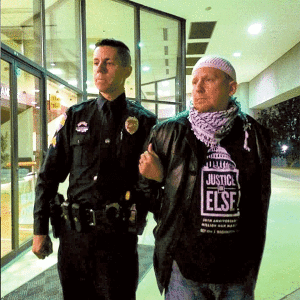
Jibril Hough
Hough: He brings the ugly side of America out, that festering cesspool of racism and old-South bigotry, all those things that have been festering for a while and Trump has found a way to tap into it and capitalize on it. It’s not just the South, it’s just that people recognize it more in the South.
He’s found a way to tap into that and it’s embarrassing as an American when the whole world is looking at you like that. They’ve seen this happen. They’ve seen it before in their countries. They’ve seen similar leaders before and they recognize this. He’s tapped into a dark underbelly that has been festering for a while. It’s something that the GOP has been playing with since 9/11. They’ve been tapping into it with a long-handled spoon and he just stirred it all up and poured it out on the floor and made a mess of it.
Ndege: Trump is taking a lot of the reactionary language that you hear from both parties; immigrants, terrorism and automatically equating terrorism to Islam. I think he’s taking a lot of that to its logical reactionary conclusion which is to build a wall and ban all Muslims. When you have those radical ends to your rhetoric, then you are inciting people who want to go even further. To me, the most dangerous thing about him is that he’s unleashed this kind of radical thinking onto the political landscape. Whether or not he wins the presidency, that’s not going to go anywhere. People like George Bush and Mitt Romney, those people are not gong to be able to speak to these people any more, it will be someone like Trump or even more vocal, then when they don’t get their way they form militias. I think we’re on a slippery slope toward fascism if this is not addressed.
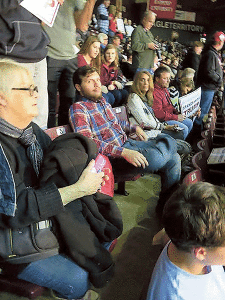
Lowell Fleming
Fleming: It’s not OK for Trump to do what he’s doing and say what he’s saying. It goes beyond political correctness. He’s validating and encouraging violence, he is validating white supremacy, he’s validating xenophobia. People who are of the groups who will suffer under him come out and chant or do silent protests that show that even if they’re afraid of him they’re still going to stand up to him.
Even though we might not change hearts and minds at the rallies we go to, having us protest shows that there’s a very sizeable chunk of American people that are not going to stand for it.
Hamid: I think it’s put a magnifying glass on how fear and hate of the other is manifested, when you have one group of people who are being encouraged to treat people who disagree with them in a way that is physical it could be very dangerous. With any political group that is out there saying that they represent America, America is a diversity of people and if you’re only going to address the needs of the people who think exactly like you then that’s not what America stands for. So, the government has to address the needs of a diversity of people with a lot of different ideologies and have to find a way for all of us to come together for what’s best for the country and not just what’s best for one particular group of people.
People do need to continue to stand up and say, ‘This is not what America should be.’ This is not what America was founded on, the idea that there can be no dissent. It’s just dangerous to have that be acceptable. This person does not agree with me and therefore I should be able to punch them in the face, that’s a big problem.
Garwood: At this stage, if I was purely a political tactician, [protests] may not be the smartest political strategy. A lot of his base likes him because he’s not establishment, so the more the establishment attacks him, or the more people like me that they might consider liberal attack him, the more entrenched his supporters are and more attractive he looks to some other people.
But the reason I think it is important for people to still show up and say something is that the rest of the world is freaking out. A message needs to be sent to them that not all Americans support him. There are Americans who see what he’s doing and they oppose him. It’s important that when someone who spouts these viewpoints comes to your town, you need to make it clear to them — the candidate and the media and the world — that there is resistance.
Rosenbluth: Nazism and fascism didn’t start with concentration camps. That was the end product, but it started with massive demonstrations where leaders stirred up hate. It seems to me if we’re going to stop the anti-immigration fear and hysteria we need to act now.
You can go in and engage directly with Trump supporters. I don’t think you’re going to change people’s minds but I think it’s important to ring the danger bell; to ring the alarm and say, ‘Look what’s happening.’ The idea of going inside was to shift the focus from his hate speech and show the historical analogy and say, ‘This is how these things start so let’s squash it before it grows.’
